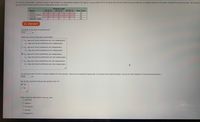
MATLAB: An Introduction with Applications
6th Edition
ISBN: 9781119256830
Author: Amos Gilat
Publisher: John Wiley & Sons Inc
expand_more
expand_more
format_list_bulleted
Question
please complete the blank problem and or ones with a red x next to it
not ones with a green check next to please

Transcribed Image Text:What sampling distribution will you use?
O binomial
O uniform
O chi-square
O normal
O Student's t
What are the degrees of freedom?
(c) Find or estimate the P-value of the sample test statistic.
O P-value > 0.100
O 0.050 < P-value < 0.100
O 0.025 < P-value < 0.050
O 0.010 < P-value < 0.025
O 0.005 < P-value < 0.010
O P-value < 0.005
(d) Based on your answers in parts (a) to (c), will you reject or fail to reject the null hypothesis of independence?
O Since the P-value > a, we fail to reject the null hypothesis.
O Since the P-value > ¤, we reject the null hypothesis.
O Since the P-value < a, we reject the null hypothesis.
O Since the P-value s a, we fail to reject the null hypothesis.
(e) Interpret your conclusion in the context of the application.
At the 5% level of significance, there is sufficient evidence to conclude that age of young adult and movie preference are not independent.
O At the 5% level of significance, there is insufficient evidence to conclude that age of young adult and movie preference are not independent.
MacBook Pro

Transcribed Image Text:Mr. Acosta, a sociologist, is doing a study to see if there is a relationship between the age of a young adult (18 to 35 years old) and the type of movie preferred. A random sample of 93 adults revealed the following data. Test whether
age and type of movie preferred are independent at the 0.05 level.
Person's Age
24-29 yr
Movie
18-23 yr
30-35 yг
Row Total
Drama
17
11
34
Science Fiction
11
8
11
30
29
Comedy
Column Total
10
10
27
34
32
93
A USE SALT
(a) What is the level of significance?
0.05
State the null and alternate hypotheses.
O H: Age and movie preference are not independent.
: Age and movie preference are independent.
O Ho: Age and movie preference are independent.
H: Age and .movie preference are independent.
O Ho: Age and movie preference are independent.
H,: Age and movie preference are not independent.
O Ho: Age and movie preference are not independent.
H,: Age and movie preference are not independent.
(b) Find the value of the chi-square statistic for the sample. (Round the expected frequencies to at least three decimal places. Round the test statistic to three decimal places.)
5.228
Are all the expected frequencies greater than 5?
Yes
No
What sampling distribution will you use?
O binomial
O uniform
O chi-square
O normal
O Student'st
Expert Solution
This question has been solved!
Explore an expertly crafted, step-by-step solution for a thorough understanding of key concepts.
Step by stepSolved in 2 steps with 3 images

Knowledge Booster
Similar questions
arrow_back_ios
arrow_forward_ios
Recommended textbooks for you
 MATLAB: An Introduction with ApplicationsStatisticsISBN:9781119256830Author:Amos GilatPublisher:John Wiley & Sons Inc
MATLAB: An Introduction with ApplicationsStatisticsISBN:9781119256830Author:Amos GilatPublisher:John Wiley & Sons Inc Probability and Statistics for Engineering and th...StatisticsISBN:9781305251809Author:Jay L. DevorePublisher:Cengage Learning
Probability and Statistics for Engineering and th...StatisticsISBN:9781305251809Author:Jay L. DevorePublisher:Cengage Learning Statistics for The Behavioral Sciences (MindTap C...StatisticsISBN:9781305504912Author:Frederick J Gravetter, Larry B. WallnauPublisher:Cengage Learning
Statistics for The Behavioral Sciences (MindTap C...StatisticsISBN:9781305504912Author:Frederick J Gravetter, Larry B. WallnauPublisher:Cengage Learning Elementary Statistics: Picturing the World (7th E...StatisticsISBN:9780134683416Author:Ron Larson, Betsy FarberPublisher:PEARSON
Elementary Statistics: Picturing the World (7th E...StatisticsISBN:9780134683416Author:Ron Larson, Betsy FarberPublisher:PEARSON The Basic Practice of StatisticsStatisticsISBN:9781319042578Author:David S. Moore, William I. Notz, Michael A. FlignerPublisher:W. H. Freeman
The Basic Practice of StatisticsStatisticsISBN:9781319042578Author:David S. Moore, William I. Notz, Michael A. FlignerPublisher:W. H. Freeman Introduction to the Practice of StatisticsStatisticsISBN:9781319013387Author:David S. Moore, George P. McCabe, Bruce A. CraigPublisher:W. H. Freeman
Introduction to the Practice of StatisticsStatisticsISBN:9781319013387Author:David S. Moore, George P. McCabe, Bruce A. CraigPublisher:W. H. Freeman

MATLAB: An Introduction with Applications
Statistics
ISBN:9781119256830
Author:Amos Gilat
Publisher:John Wiley & Sons Inc

Probability and Statistics for Engineering and th...
Statistics
ISBN:9781305251809
Author:Jay L. Devore
Publisher:Cengage Learning

Statistics for The Behavioral Sciences (MindTap C...
Statistics
ISBN:9781305504912
Author:Frederick J Gravetter, Larry B. Wallnau
Publisher:Cengage Learning

Elementary Statistics: Picturing the World (7th E...
Statistics
ISBN:9780134683416
Author:Ron Larson, Betsy Farber
Publisher:PEARSON

The Basic Practice of Statistics
Statistics
ISBN:9781319042578
Author:David S. Moore, William I. Notz, Michael A. Fligner
Publisher:W. H. Freeman

Introduction to the Practice of Statistics
Statistics
ISBN:9781319013387
Author:David S. Moore, George P. McCabe, Bruce A. Craig
Publisher:W. H. Freeman